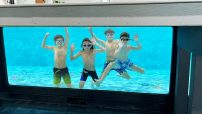POWER 25
• 2010 Power 25: Reinventors
It’s a crucial moment for aquatics. Here’s a look at who’s changing the game, for good!
• 2009 Power Forces
The current economic crisis is likely to shape much of what happens in 2009. We’ve asked past Power 25 honorees to weigh in on how it might affect aquatics — and what professionals can do to weather the storm.
Until Sung Choe became part of the recreational water program at NSF International in 2004, he had very little to do with aquatics.
“I enjoyed waterparks, but I didn’t really know the complicated nature of the operation,” recalls Choe, a Michigan State University graduate with a degree in microbiology.
Now, as technical manager of NSF’s recreational water program, he understands quite a bit about pool systems and operations.
“Early on I obviously didn’t know very much about the industry,” Choe says. “However, there are a lot of passionate people in the industry and they were willing to spend the time with me.”
Recreational water is the second oldest program for NSF, but there’s still a lot of room for growth. That’s one reason Choe was enthusiastic about participating in the MAHC project as chair of the Monitoring and Testing Technical Committee. That group is reviewing and making recommendations on equipment for monitoring and testing, including controllers and other devices.
“The hope is that the final code will answer questions such as ’How often should you test for different attributes?’ and ’What types of different bacteria should you test for?’” Choe notes.
In completing the project, he says the team used a consensus-building process similar to the one used at NSF.
“Initially, we started with a ‘perfect world’ scenario; then we had to scale down and figure out what is practical, critically central to public health,” he explains.
Looking back, Choe has a firsthand understanding of the value of the MAHC.
“When I first came on board I had lots of questions and there were varying answers,” he recalls. “To have one document will be helpful. It’s been needed to bring the industry together.”



